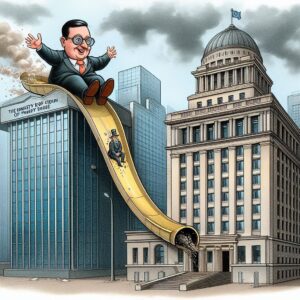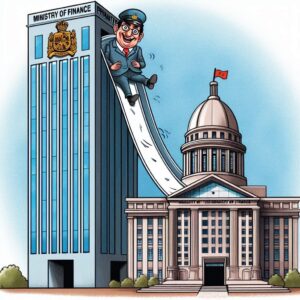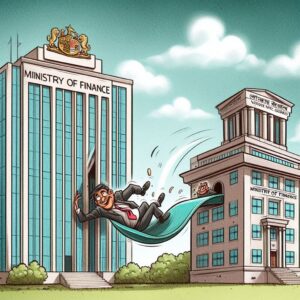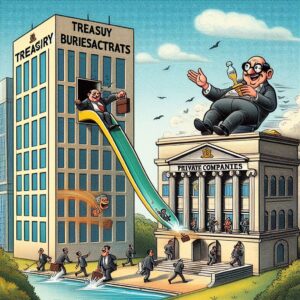官僚の天下りとは?
この風刺画について
この風刺画「官僚の天下り」は、国家の財政機関や官公庁に所属する高級官僚たちが、引退後も“特別なルート”で民間企業や外郭団体に再就職し、高待遇を享受する現象を描いたものです。
日本をはじめ多くの国で問題視されている「天下り制度」や「ゴールデン・パラシュート(退職後の優遇措置)」に対し、視覚的かつ皮肉的に切り込んだ作品となっています。
TOPの風刺画は3つの場面に分かれています。
左の風刺画では、財務省らしき高層ビルの屋上から滑り台で滑り降りる官僚が描かれており、その手には大きなドル袋が握られています。
滑り降りた先には、いかにも豪奢な民間企業のビルが建っており、彼がスムーズに新たな地位へと“移行”していることが分かります。
中央の風刺画では、「Ministry of Finance」と記された巨大な官公庁から、金色のチューブ型滑り台を滑る別の官僚が登場しています。
彼が着地しようとしている先は、「銀行」や「政策研究所」といった利権が集まりやすい組織です。
これにより、国家の内部情報や人脈がそのまま移転されている現実を示しています。
右の風刺画では、ソファにふんぞり返った官僚がオフィスチェアのまま滑り降りています。この姿は、再就職先でも引き続き権力や快適な待遇を享受しているという印象を与えます。後方にはすでに次の人物が待機しており、まるでシステマチックに繰り返される仕組みであることを表現しています。
この風刺画全体を通じて、「官から民へのスムーズすぎる移動」と、それに伴う特権構造を視覚化し、見る人に問題意識を呼び起こすことを目指しました。
風刺画のポイント
この風刺画を描くうえで、私が最も意識したのは「楽しげな表情と現実のギャップ」です。
登場する官僚たちは皆、笑顔で滑り台を滑っていますが、その背景には「公私混同」「利益誘導」「税金の私的利用」といった深刻なテーマが隠されています。
このギャップこそが風刺の醍醐味であり、見る者に「なぜ笑っているのか?」という違和感を与えることで、内在する問題への気づきを促す狙いがあります。
滑り台というモチーフを選んだのは、「苦労もせず、抵抗もなく降りられる」構造を象徴させるためです。
通常、退職や転職には不安や困難がつきものですが、彼らにはそれが存在しません。
むしろ、手厚く敷かれた“滑り台”が待っており、安全で豪華な着地点が用意されています。
この非現実的なほど快適な移行ルートこそが、一般社会との断絶を強調しています。
また、建物のディテールにもこだわりました。財務省や中央省庁は堅牢で権威ある建物として描き、対照的に受け入れ先の企業は高級感と余裕を漂わせています。
この対比により、官僚の“二つの顔”――公共の奉仕者としての顔と、利益享受者としての顔――を浮かび上がらせることができます。
3つの風刺画の構図も意図的に変化をつけました。
左は横方向へのスライド、中は縦方向の移動、右は椅子に座ったままの滑降です。
これにより、さまざまな天下りの形態――役員就任、顧問職、研究職など――を象徴的に網羅しています。
官僚たちが使用する滑り台の素材や色も変え、シルバー、ゴールド、オフィスチェアといった“個性”を持たせることで、見る側に「自分の国にも似た事例があるのでは?」と想像させる工夫を凝らしました。
さらに、右端の風刺画に登場する“次の滑降者”は、制度が個人に依存するものではなく、組織的・制度的に設計されていることを示しています。
この構造こそが問題の根幹であり、風刺画として最も強く伝えたいメッセージです。
この作品は、笑いと皮肉を通して、“公共”と“私利”のあいだに潜む曖昧さをあぶり出す試みです。
読者が一瞬でも「これは笑って見ていいのか?」と立ち止まってくれたなら、それが風刺画としての役割を果たした証だと感じます。
AIが描いた「官僚の天下り」
 |
 |
 |
 |
 |
 |
 |
 |

コメント